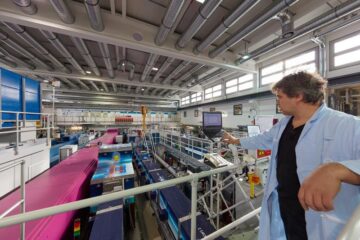Novel Marker for Diagnosis of Celiac Disease

</a><strong>Background</strong><br>Celiac disease is a worldwide autoimmune disorder characterized by gluten intolerance, and is associated with a number of serious clinical conditions. The percentage of people with celiac disease is worldwide about 1%. In spite of increasing disease awareness, the mean diagnosis rate of 20 % remains low.<br><br>
Due to insufficient significance of present serological markers, biopsy and histology are the gold-standards for diagnosis. Therefore, a still unmet need is the development of a non-invasive, reliable diagnostic test for celiac disease.<br><br> <strong>Technology</strong><br>Here we provide a novel marker, which exhibits a higher sensitivity than any other known diagnostic test for celiac disease. Furthermore, the novel marker features the detection by antibodies from patient sera under denaturated conditions, which allows the design of various assay formats of diagnostic kits.<br><br> <b>Benefits:</b><ul> <li>Discovery of a novel protein and peptide combination, that facilitates effective and cheap diagnosis of celiac disease</li> <li>Recognition of antibodies from celiac disease patients sera with high sensitivity and specificity</li> <li>The marker features the detection by antibodies from patient sera under denaturing conditions, which allows the design of various assay formats of diagnostic kits.</li> <li>The diagnostic assay can be of any type, such as ELISA, Luminex bead arrays and strip arrays etc.</li> </ul> <p><strong>IP Rights</strong><br> DE-Priority (10/2009).<br> PCT Application (10/2010).<br> <br> <strong>Patent Owner</strong><br> Charité – Universitätsmedizin Berlin</p>
Weitere Informationen: PDF
ipal GmbH
Tel.: +49 (0)30/2125-4820
Ansprechpartner
Dr. Dirk Dantz
Media Contact
Alle Nachrichten aus der Kategorie: Technologieangebote
Neueste Beiträge

Bakterien für klimaneutrale Chemikalien der Zukunft
Forschende an der ETH Zürich haben Bakterien im Labor so herangezüchtet, dass sie Methanol effizient verwerten können. Jetzt lässt sich der Stoffwechsel dieser Bakterien anzapfen, um wertvolle Produkte herzustellen, die…

Batterien: Heute die Materialien von morgen modellieren
Welche Faktoren bestimmen, wie schnell sich eine Batterie laden lässt? Dieser und weiteren Fragen gehen Forschende am Karlsruher Institut für Technologie (KIT) mit computergestützten Simulationen nach. Mikrostrukturmodelle tragen dazu bei,…

Porosität von Sedimentgestein mit Neutronen untersucht
Forschung am FRM II zu geologischen Lagerstätten. Dauerhafte unterirdische Lagerung von CO2 Poren so klein wie Bakterien Porenmessung mit Neutronen auf den Nanometer genau Ob Sedimentgesteine fossile Kohlenwasserstoffe speichern können…

















